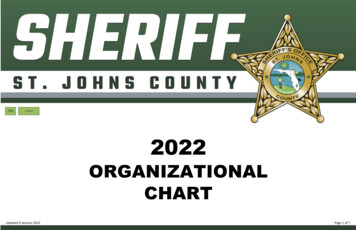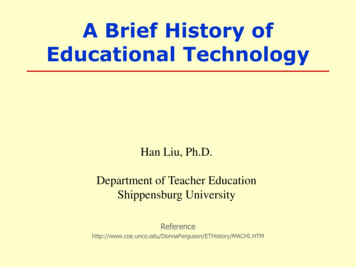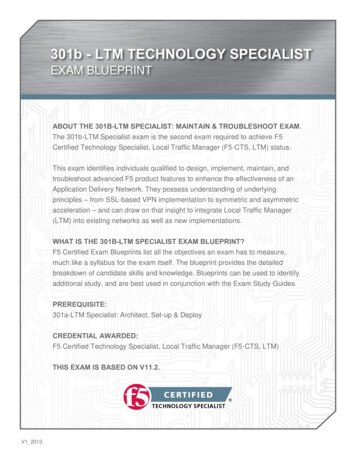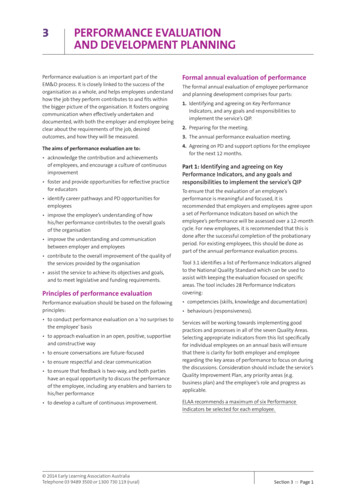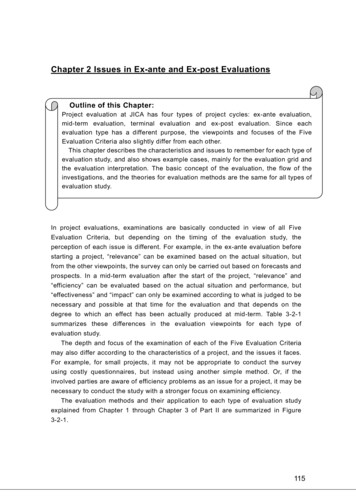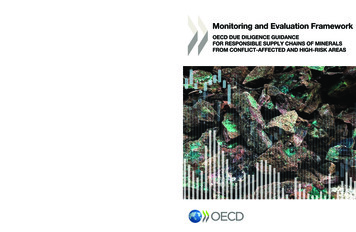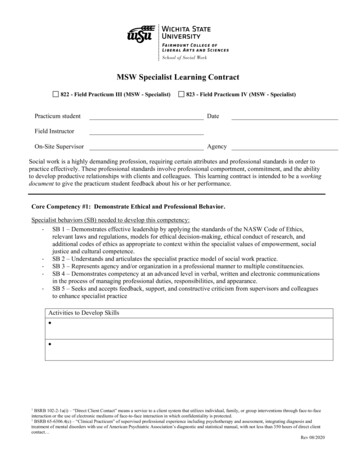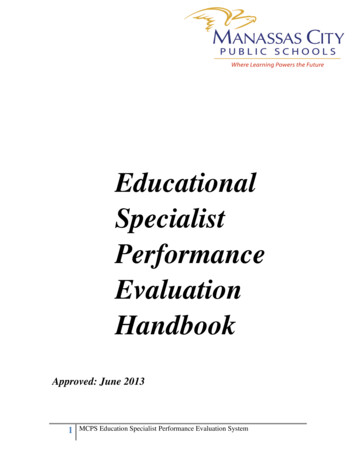
Transcription
Approved: June 20131MCPS Education Specialist Performance Evaluation System
ACKNOWLEDGMENTSWe wish to thank Dr. Catherine Magouyrk, Superintendent of ManassasCity Public Schools, and the Manassas City Public Schools EducationSpecialist Evaluation Division Committee for their conscientious andthoughtful efforts in developing this handbook, which aligns the VDOEguidelines piloted through the facilitation by Dr. James H. Strong. Membersof the division committee included:Victoria BurkettDavid BoydEllie LasherConnie JuddBetsy LindbergStephanie ChesterLisa RauRachael FodnessSchenell AgeeKathryn DyessRebecca StoneKen LaLonde2School PsychologistSchool PsychologistEducational DiagnosticianEducational DiagnosticianSchool Social WorkerSchool Social WorkerGifted and Talented TeacherLibrary Media SpecialistLibrary Media SpecialistLibrary Media SpecialistDirector of Special EducationDirector of Human ResourcesMCPS Education Specialist Performance Evaluation System
TABLE OF CONTENTSPART I: Introduction and ProcessIntroduction . 7Purposes . 7Identifying Educational Specialist Performance Standards . 8Performance Standards . 8Performance Indicators . 9Documenting Performance . 10Learner/Program Progress . 12Observations . 13Educational Specialist Documentation Log . 13Client Surveys . 17Alignment of Performance Standards with Data Sources. 17Evaluation Schedule. 18Documentation Records . 18Making Summative Decisions . 20Definitions of Ratings . 20Rating Educational Specialist Performance . 22Single Summative Rating . 23Improving Professional Performance . 24Support Dialogue . 25Performance Improvement Plan . 253MCPS Education Specialist Performance Evaluation System
PART II: Performance StandardsPerformance Standard 1: Knowledge of the Learning Community. 27Performance Standard 2: Program Planning and Management . 28Performance Standard 3: Assessment . 29Performance Standard 4: Program Services . 30Performance Standard 5: Communication and Collaboration . 31Performance Standard 6: Professionalism . 32Performance Standard 7: Learner/Program Progress . 33PART III: Forms and LogsIntroduction . 34Goal Setting Process . 35Goal Setting for Learner/Program Progress Form . . .40Observation/Document Review Form . 42Pre-Observation Conference Record . 46Educational Specialist Documentation Log Cover Sheet . 47Sample Communication Log . 50Professional Development Log . 51Grade K-2 Learner Survey Form . 52Grade 3-5 Learner Survey Form . 53Grade 6-8 Learner Survey Form . 54Grade 9-12 Learner Survey Form . 55Student Survey Library Media Specialist Form. 56Client Survey for Teachers and Administrators.56Client Survey for Families Form . 574MCPS Education Specialist Performance Evaluation System
Learner Survey Summary .58Educational Specialist Summative Performance Report .60Educational Specialist Interim Performance Report .65Performance Improvement Plan .67REFERENCES and ENDNOTES .68FIGURESFigure 1: Sample of Performance Standards and Indicators . .10Figure 2: Data Sources for Educational Specialists .11Figure 3: Sample Items in a Documentation Log .15Figure 4: Aligning Multiple Data Sources with Performance Standards .17Figure 5: ESPES Evaluation Schedule .19Figure 6: Definition of Terms Used in Rating Scale .21Figure 7: Sample Rubric of Educational Specialist Performance .23Figure 8: Two Tools to Increase Professional Performance .24Figure 9: Items Used as Evidence of Quality Work Performance .34Figure 10: Learner Achievement/Program Goal Setting Process .35Figure 11: Acronym for Developing Goals .36Figure 12: Sample Goals .36Figure 13: Examples of Data Sources for Monitoring Learner/Program Progress .38Figure 14: Examples of Strategies to Improve Learning .395MCPS Education Specialist Performance Evaluation System
PART I: INTRODUCTION AND PROCESSINTRODUCTIONThe Manassas City Public Schools Educational Specialist Performance EvaluationSystem (ESPES) uses the Goals and Roles Performance Evaluation Model (short title:Goals and Roles Model ) developed by Dr. James Stronge for collecting and presentingdata to document performance based on well-defined job expectations.The ESPES provides a balance between structure and flexibility. It is prescriptive in thatit defines common purposes and expectations, thereby guiding effective instructionalpractices. At the same time, it provides flexibility, thereby allowing for creativity andindividual educational specialist initiative. The goal is to support the continuous growthand development of each educational specialist by monitoring, analyzing, and applyingpertinent data compiled within a system of meaningful feedback. NOTE: Throughout thisdocument, the term “learner” is used to describe students, teachers, and families whoreceive services from the educational specialist. Educational Specialist refers to LibraryMedia Specialists, School Psychologists, Educational Diagnosticians, Gifted andTalented Teachers, and School Social Workers.PURPOSESThe primary purposes of ESPES are to: optimize learner learning and growth, improve the quality of instruction by ensuring accountability for classroomperformance and educational specialist effectiveness, contribute to successful achievement of the goals and objectives defined in thevision, mission, and goals of Manassas City Public Schools, provide a basis for instructional improvement through productive educationalspecialist performance appraisal and professional growth, and implement a performance evaluation system that promotes collaboration betweenthe educational specialist and evaluator and promotes self-growth, instructionaleffectiveness, and improvement of overall job performance.The distinguishing characteristics of ESPES are: a focus on the relationship between professional performance and improvedlearner academic achievement, sample performance indicators for each of the educational specialist performancestandards, a system for documenting educational specialist performance based on multipledata sources,6MCPS Education Specialist Performance Evaluation System
a procedure for conducting performance reviews that stresses accountability,promotes professional improvement, and increases the involvement of educationalspecialists in the evaluation process, and a support system for providing assistance when needed.IDENTIFYING EDUCATIONALSPECIALIST PERFORMANCESTANDARDSClearly defined professional responsibilities constitute the foundation of the ESPES. Afair and comprehensive evaluation system provides sufficient detail and accuracy so thatboth educational specialists and evaluators (i.e., principal, supervisor) reasonablyunderstand the job expectations. The term site administrator will be used forprincipals/supervisors. Additionally, a site administrator may designate an administratorto collect information on employee job performance. The site administrator remainsinformed of the assessment process and is responsible for the summative evaluation ofthe educational specialist.The expectations for professional performance are defined using a two-tiered approach.Performance StandardsPerformance IndicatorsPERFORMANCE STANDARDSPerformance standards refer to the major duties performed. There are seven performancestandards for all educational specialists.Performance Standard 1: Knowledge of the Learning CommunityThe educational specialist identifies and addresses the needs of the learning communityby demonstrating respect for individual differences and understanding of cultures,backgrounds, and learning needs.Performance Standard 2: Program Planning and ManagementThe educational specialist effectively plans, coordinates, and implements programs andservices consistent with established guidelines, policies, and procedures.Performance Standard 3: Assessment7MCPS Education Specialist Performance Evaluation System
The educational specialist gathers, analyzes, and uses data to determine learner needs, tomeasure learner or program progress, to guide instruction, and to provide timely feedbackto learners, families, and staff.Performance Standard 4: Program ServicesThe educational specialist uses knowledge of subject/field/technology to implementservices and to provide support for the learning community consistent with establishedstandards and guidelines.Performance Standard 5: Communication and CollaborationThe educational specialist communicates and collaborates effectively with learners,families, staff, and the community to support learning and well-being.Performance Standard 6: ProfessionalismThe educational specialist maintains a commitment to professional ethics, demonstratesprofessional expertise, and participates in professional growth.Performance Standard 7: Learner/Program ProgressThe work of the educational specialist results in acceptable and measurable learner orprogram progress based on established standards, division goals, and/or school goals.PERFORMANCE INDICATORSPerformance indicators provide examples of observable, tangible behaviors. Theperformance indicators are examples of the types of performance that will occur if astandard is being successfully met. The list of performance indicators is not limitedand all educational specialists are NOT expected to demonstrate each performanceindicator.Both educational specialists and evaluators should consult the sample performanceindicators for clarification of what constitutes a specific performance standard. As anillustration, performance indicators for the Knowledge of the Learning Communitystandard are listed in Figure 1 below.Figure 1: Sample of Performance Standard and Indicators8MCPS Education Specialist Performance Evaluation System
Performance Standard 1: Knowledge of the Learning CommunityThe educational specialist identifies and addresses the needs of the learningcommunity by demonstrating respect for individual differences and understanding ofcultures, backgrounds, and learning needs.Sample Performance IndicatorsExamples of educational specialist work conducted in the performance of the standardmay include, but are not limited to:The educational specialist:1.1 Demonstrates an understanding of developmental stages of learners.1.2 Collaborates with and uses district, school, family, and community resources tohelp meet learner and/or program needs.1.3 Uses cultural competency skills to identify and accommodate various learningstyles and other individual differences.1.4 Demonstrates an understanding of cultural, ethnic, and linguistic backgrounds toassist in the delivery of appropriate educational opportunities.The performance indicators are provided to help educational specialists and theirevaluators clarify job expectations. As mentioned, all performance indicators may not beapplicable to a particular work assignment. Ratings are NOT made at the performanceindicator level but at the performance standard level.DOCUMENTING PERFORMANCEA fair and equitable performance evaluation system for the role of a professionalacknowledges the complexities of the job. Thus, multiple data sources are necessary toprovide for a comprehensive and authentic “performance portrait” of the educationalspecialist’s work. The sources of information briefly described in Figure 2 below provideaccurate feedback on educational specialist performance.Figure 2: Data Sources for Educational Specialists9MCPS Education Specialist Performance Evaluation System
Data SourceDefinitionGoal Setting for Educational specialists have a definite impact on learning and performancethrough their various roles. Depending on grade level, content area, andLearner/learners’ ability levels, appropriate measures of academic performance areProgramidentified to provide information on learning gains. Performance measuresProgressinclude standardized test results as well as other pertinent data sources.Educational specialists set goals for improving Learner/Program Progressbased on the results of performance measures. The goals and theirattainment constitute an important data source for evaluation.ObservationsObservations provide key information on several of the specific standards.Probationary educational specialists will be observed at least three timesper year. Two of these observations will occur prior to the end of the firstsemester and the third by March 1. Continuing Contract/VeteranEducational Specialists will be observed at least once per year. Additionalobservations for any staff member will be at the site administrator’sdiscretion. All observations will be at least 20 minutes and will include apost-conference. A pre-conference may be conducted at the request of theeducational specialist or the gThe Documentation Log includes specific required artifacts that provideevidence of meeting selected performance standards.ClientSurveysEducational specialists are required to survey their learners, teachers,and/or administrators, therein called clients. It is recommended thateducational specialists enter a summary of the results in theirDocumentation Log. These surveys will provide additional data, whichwill be used to provide insight regarding the educational specialist’sgrowth and development.10MCPS Education Specialist Performance Evaluation System
Learner Achievement/Program Goal Setting aOne approach to linking learner achievement to educational specialist performanceinvolves building the capacity for educational specialists and their supervisors to interpretand to use learner achievement data to set target goals for learner improvement. Settinggoals – not just any goals, but goals set squarely on learner performance – is apowerful way to enhance professional performance and, in turn, positively impact learnerachievement. Learner Achievement/Program Goal Setting b is designed to improvelearner learning.Educational specialists have a definite impact on learning and performance through theirvarious roles. Depending on grade level, content area, and learners’ ability level,appropriate measures of learner performance are identified to provide information onlearning gains. Educational specialists set goals for improving Learner/Program Progressbased on the results of performance measures. The goals and their attainment constitutean important data source for evaluation.The Intent of Learner Achievement/Program Goal SettingThe purposes of goal setting include focusing attention on learners and on instructionalimprovement based on a process of utilizing baseline data, developing strategies forimprovement, and assessing results at the end of the academic year. More specifically,the intent of learner achievement/program goal setting is to:ab make explicit the connection between teaching and learning, make instructional decisions based upon learner data, provide a tool for school improvement, increase the effectiveness of instruction via continuous professional growth, focus attention on learner results, and ultimately, increase learner achievement 1Portions of this section were adapted from teacher evaluation handbooks published in various states,copyright [2010] by J. H. Stronge and Stronge, J. H. & Grant, L.W. (2009). Adapted with permission.Copyright (2009) by James H. Stronge and Leslie W. Grant. Used with permission. When used foreducational specialists, the Student Achievement Goal Setting Process may be modified to be the LearnerAchievement/Program Goal Setting Process.11MCPS Education Specialist Performance Evaluation System
OBSERVATIONSObservations are intended to provide information on a wider variety of contributionsmade by educational specialists in the classroom or to the school community as a whole.Administrators are continually observing in their schools by walking through classroomsand non-instructional spaces, attending meetings, and participating in school activities.These day-to-day observations are not necessarily noted in writing, but they do serve as asource of information. The Observation Form is used to provide targeted feedback oneducational specialists’ effectiveness related to seven performance standards:Knowledge of the Learning Community, Program Planning and Management,Assessment, Program Services, Communication and Collaboration, Professionalism, andLearner/Program Progress.Observations provide key information on several of the specific standards.Probationary/New to district educational specialists will be observed at least three timesper year. Two of these observations will occur prior to the end of the first semester andthe third by March 1 (refer to Figure 5). Continuing Contract/Veteran Educationalspecialists employed under a continuing contract will be observed at least once per year. cAdditional observations for any staff member will be at the building administrator’sdiscretion. All observations will be of at least 20 minutes and will include a postconference. A pre-conference may be conducted at the request of the educationalspecialist or the administrator.Evaluators use observations as one source of information to determine whether aneducational specialist is meeting the performance standards. The evaluator providesfeedback about the observation using the observation form and through a post-conferencewith the educational specialist. Other observation forms may be used at the evaluator’sdiscretion.After each observation, one copy of the observation form will be given to the educationalspecialist and one copy will be maintained by the evaluator for the entire evaluation cycleto document growth and development.EDUCATIONAL SPECIALIST DOCUMENTATION LOGThe purpose of the Educational Specialist Documentation Log (see Part III) is to provideevidence of performance related to specific standards. There are three items requiredin the Educational Specialist Documentation Log (Cover Sheet, Service Log orProgram Plan, and Communication Log); however, other documents may be included,such as: Evidence of Professional Development, Record of Extracurricular Activities,Evidence of Assessment for Learning, and other documents related to the EducationalSpecialist Evaluation Standards. These documents provide administrators withcSome educational specialists cannot obtain continuing contract status in Virginia e.g., nurses, schoolpsychologists. Three years of experience is considered to be “veteran.”12MCPS Education Specialist Performance Evaluation System
information they likely would not receive in an observation. Specifically, the EducationalSpecialist Documentation Log provides the educational specialist with an opportunity forself-reflection, demonstration of quality work, and a basis for two-way communicationwith the site administrator. The emphasis is on the quality of work, not the quantity ofmaterials presented.A cover sheet for items to include is presented in Part III. The cover sheet should beplaced at the front of the required and optional documents. Documentation is not requiredfor all performance standards as other data sources may be used.Administrators and evaluators review the documentation log annually. Additionally,educational specialists in their probationary period will meet with administrators and/orevaluators to review their documentation log by the end of the first semester.Educational Specialist Documentation Logs should be available at the request of the siteadministrator and/or evaluator.A Documentation LogA Documentation Log: is one component of a multi-source evaluation and complements the observationcomponents of the educational specialist evaluation system prior to the summativeevaluation, is a collection of artifacts that result from job description, may be kept as electronic files or in paper form (e.g. three ring binder, file folder), must include the required documentation listed on the cover sheet, is a work in progress; it is to be updated regularly throughout the evaluation period(weekly/ monthly), should be available for review at administrator’s request, should be user-friendly (neat, organized), remains in educational specialist’s possession except when reviewed by theevaluator, belongs to the employee, and will be checked at least one time per year with feedback provided.A Documentation Log is NOTA Documentation Log is not: a portfolio, or additional forms or materials created solely for the purpose of evaluation.13MCPS Education Specialist Performance Evaluation System
Figure 3 shows items that may be included in a Documentation Log. This is not a limitedlist; these items are merely shown as examples.Required ItemsFigure 3: Sample Items in a Documentation LogStandardsRequiredItem1. Knowledge ofthe LearningCommunityNo evidence isrequired in theDocumentationLog2. ProgramPlanning andManagementEvidence ofusing data aboutstudent learningto guideplanning andinstruction14Suggested Examples of EvidenceCan include (but not required): Transcripts of coursework Professional Development certificates Annotated list of instructional activities Lesson/intervention plan Journals/notes that represent reflective thinkingand professional growth Samples of innovative approaches developed byeducational specialist Behavior plans Parent communication logsCan include (but not required): Differentiation in lesson planning and practice Analysis of classroom assessment Data driven curriculum revision workExamples:- Sample lesson or unit plan- Course syllabus- Intervention plan- Behavior Management Plan- Annotated learning objectives- Service Log- ScheduleMCPS Education Specialist Performance Evaluation System
StandardsRequiredItem3. AssessmentDatademonstratingprogram and/orinterventioneffectiveness4. ProgramServicesService orProgram LogSuggested Examples of EvidenceCan include (but not required): Evidence of baseline and periodic assessments andanalysis Progress reports Graphs or tables of learner results Summary of assessment procedures Notifications made on a modified interventionand/or program based on feedback Records within electronic curriculum mappingtoolExamples:- Brief report describing your record keepingsystem and how it is used to monitor learnerprogress- Copy of scoring rubrics- Photographs or photocopies of learner workwith written comments- Samples of educational reports, psychologicalreports, progress reports or letters prepared forparents or learners- Copy of disaggregated analysis of learnerachievement scores on standardized test- Copy of learner journals of self-reflection andself-monitoringCan include: Educational specialist-specific resources based onthe needs of the community- Summary of client surveys5. CommunicationandCollaborationCommunicationLog6. /transcriptsGoal Setting forLearner/ProgramProgress Form7. Learner/ProgramProgress15- Educational Diagnostician/SchoolPsychologist: CI/Eligibility AccountabilityLogs with Recommendations- Media Specialist: Collection Development- Social Worker: Record of interventionsCan include: Examples of collaborative work with peers Evidence of communication with learners,families, colleagues and communityCan include (but not required): Record of professional development taken orgivenLearner Achievement/Program Goal SettingDocument – to be revised at midterm and end of yearMCPS Education Specialist Performance Evaluation System
CLIENT SURVEYSThe term client refers to the learners, teachers, administrators and/or parents theeducational specialist works with throughout the school year. The purpose of the clientsurvey is to collect information that will help the educational specialist reflect onpractices; in other words, to provide feedback directly to the educational specialist forgrowth and development. The questions in this survey provide information that may notbe accurately obtained in observations.Client information is obtained through the surveys designed to provide useful feedback tothe educational specialist. The educational specialist administers the survey to clients. Atthe educational specialist’s discretion, additional questions may be added.The educational specialist retains sole access to the results of the client surveys. It isrecommended that the educational specialist include a summary of the survey data in theDocumentation Log.ALIGNMENT OF PERFORMANCE STANDARDS WITHDATA SOURCESSome performance standards are best documented through observation (e.g., Knowledgeof the Learning Community); other standards may require additional documentationtechniques (e.g., Learner/Program Progress entails a review of the goal set). Therefore,multiple data sources are used. Figure 4 shows the alignment of performance standard bydata source.1. Knowledge of the Learning Community2. Program Planning and Management3. Assessment4. Program Services5. Communication and Collaboration6. Professionalism7. Learner/Program lSettingPerformance gure 4: Aligning Multiple Data Sources with Performance Standards/////X indicates a strong relationship/ indicates a relationshipFormal evaluation of performance quality
Betsy Lindberg School Social Worker . Stephanie Chester School Social Worker . Lisa Rau Gifted and Talented Teacher . Rachael Fodness Library Media Specialist . implement a performance evaluation system that promotes collaboration between the educational specialist and evaluator and promotes self-growth, instructional
